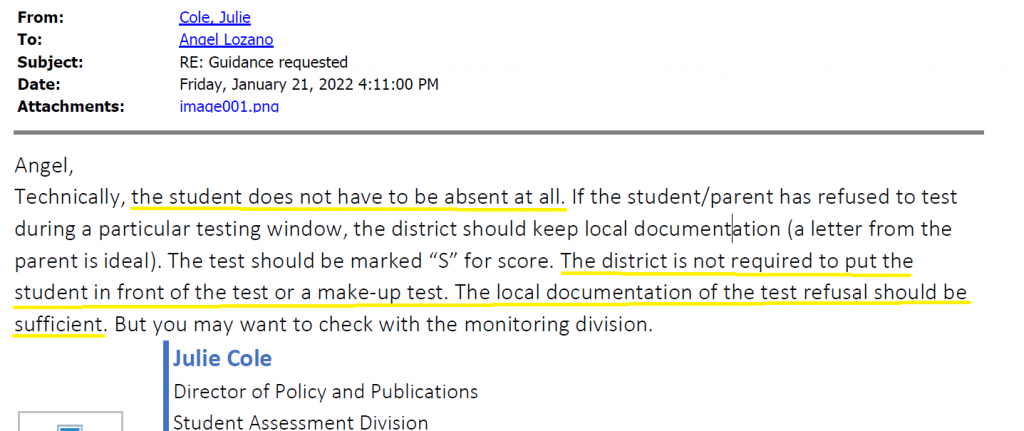TEA Confirms: School Can Accept Parental Refusal of STAAR
From the earliest days of the Opt Out movement, the TEA has carved out a dichotomy between Opt Out and parental refusal that has confounded and frustrated parents and, indirectly, led to increased conflict between parents and schools. However, as time has passed, the TEA’s outlook has become increasingly more realistic and focused on de-escalating conflict while still insisting upon participation. For years, we have argued against the scoring of refused assessments. One reason for this is that the practice of scoring refused assessments led to bizarre behavior by schools. While some schools adopted parent friendly approaches like permitting the child to refuse assessment with the parent present, other schools insisted that a child refusing the assessment must be placed in a room, read all the instructions, instructed to begin work, and not released until the full time to complete the assessment passed. Still other schools felt it was fair game to try to trick the students into taking the assessment, leading to predictable ploys like “Your mother just called” and requiring parents to implement password systems to thwart these childish games.
For several years, we have pushed back against those who lay all the blame for bad STAAR behavior on the TEA and pointed out that districts have broad authority to work with parents. In fact, most of the “bad behaviors” we experience due to STAAR are the result of local decisions. When the TEA has acted reasonably, we have applauded them and put the responsibility for bad conduct where it truly belongs. Today is another one of those days. Following several reports of students who stayed off campus for an entire assessment window being scored as having refused, we began to hear rumors that the TEA had told schools that if the parents indicated a refusal, the schools could submit the blank assessment for scoring, even if the student never set foot on campus.
This was a tidal shift, because for years the party line of the school has been “If the student is on campus, we must put the assessment in front of them and tell them to take it.” No more. In response to a recent Public Information Request, TPERN has received documents that confirm that “If the student/parent has refused to test during a particular testing window, the district . . . is not required to put the student in front of the test or a make-up test.” The district need only maintain local documentation of the refusal. This gives the Opt Out letter new importance. Under the guidance of the TEA, the letter now constitutes sufficient evidence to permit the school to submit a blank assessment. The student does not need to be absent for an entire administration window, or even for a single day. And explicitly, the school is not required to put the assessment in front of the student for refusal. As it should be, the word of the parent is sufficient.

Notably, this response was made directly to a district that was asking if it was permissible to not pull a student for makeup testing if they were absent on the assessment day and had a parent note of refusal. Julie Cole made clear, that even if they are there on the assessment day, the school does not have to put the student in front of a test. Similar guidance was given to ESC 14 when a school sought approval of instructions to parents that they must stay home the entire assessment window or take a makeup.
These communications should put to rest any school claims that they are “required” to present the assessment to the student. They aren’t. They never have been. This common sense approach permits schools and parents to work together. It de-escalates needless conflict and permits the viewpoints of both sides to be heard. We applaud the TEA for clarifying this matter once and for all.
For our parents, we suggest:
(1) Use the new opt out letter which contains the refusal language;
(2) Verify with the school that your child will not be presented with the assessment. Use these emails if needed.(Full Copy Lozano Email; Full Copy Wilson Email)
(3) We still suggest being willing to keep the student home for the main assessment days, as the schools are unlikely to be able to accommodate them with any normal learning activities.

